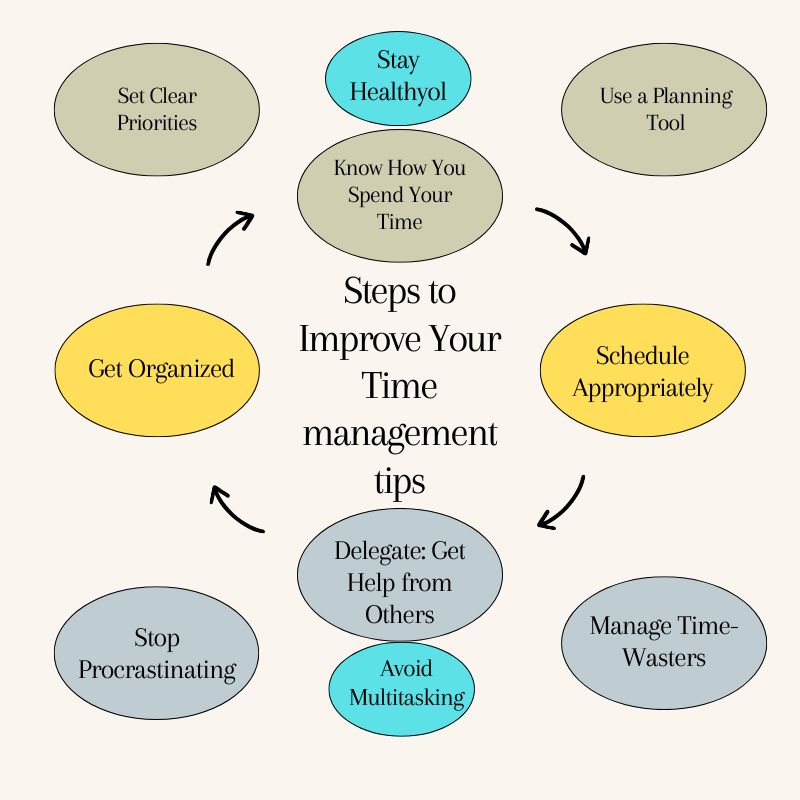In today’s fast-paced world, mastering your time isn’t just about getting more done—it’s about living with purpose and balance. Effective time management allows you to achieve personal growth, reduce stress, and boost overall productivity. Whether you’re a student, entrepreneur, or working professional, these time management tips for self-growth and productivity will help you make every hour count.
Time Management Tips

1. Know How You Spend Your Time
The first step toward effective time management is awareness. Track your daily habits for a week—note how much time you spend on work, social media, chores, and rest.
Use tools like RescueTime or Toggl Track to get insights. Once you identify time-draining tasks, you can adjust your schedule to align with your goals.
Self-awareness transforms wasted hours into opportunities for growth.
2. Set Clear Priorities
Not all tasks deserve equal attention. Use the Eisenhower Matrix to categorize your activities:
- Important & urgent: Do immediately.
- Important but not urgent: Schedule it.
- Urgent but not important: Delegate.
- Neither: Eliminate.
By focusing on what truly matters, you prevent burnout and align your daily routine with your long-term vision for self-growth and productivity.
3. Use a Planning Tool
Digital calendars and task managers (like Google Calendar, Notion, or Trello) help you organize and visualize your week.
Plan your day each morning or the night before—add deadlines, reminders, and even “focus time” slots.
A planning tool doesn’t just structure your day; it builds discipline and accountability—key traits for personal and professional success.
4. Get Organized
Clutter, whether physical or digital, drains mental energy.
Start by cleaning your workspace, labeling folders, and minimizing distractions.
Organize your digital life too—sort files, clear your inbox, and maintain to-do lists.
A structured environment helps your brain stay calm, improving clarity, focus, and emotional balance.
5. Schedule Appropriately
Everyone has different energy peaks throughout the day.
Schedule demanding tasks (like studying or strategy work) during your peak energy hours, and routine tasks when your energy dips.
Use the Pomodoro Technique—25 minutes of focus followed by a 5-minute break—to maintain rhythm and prevent fatigue.
Smart scheduling helps you work with your energy, not against it.
6. Delegate: Get Help from Others
Delegation isn’t a weakness—it’s a skill.
Whether at home or work, identify tasks that others can handle efficiently.
Delegating frees up your time for higher-value activities that contribute directly to your goals and growth.
It also builds trust and teamwork, both essential for long-term productivity.
7. Stop Procrastinating
Procrastination often comes from fear of failure or perfectionism.
Break big goals into small, actionable steps and reward yourself for completing each one.
Try the 2-minute rule—if something takes less than two minutes, do it immediately.
Momentum builds confidence, and consistency becomes the foundation of self-growth.
8. Manage Time-Wasters
Identify distractions—social media, excessive emails, or multitasking—and set limits.
Consider “digital detox” hours or productivity apps that block distractions during focus time.
Remember: productivity isn’t about doing more; it’s about doing what matters most.
When you protect your time, you protect your growth.
9. Avoid Multitasking
Despite its popularity, multitasking reduces efficiency and increases stress.
Instead, try single-tasking—focus on one task at a time until completion.
It improves concentration, accuracy, and satisfaction.
You’ll not only get more done but also feel more accomplished and mindful throughout the day.
10. Stay Healthy
Time management and health are deeply connected.
Good sleep, balanced nutrition, and regular exercise keep your brain sharp and your body energized.
When you’re well-rested, you make better decisions, manage stress effectively, and sustain focus.
Healthy habits amplify productivity and nurture personal development
Bonus Tip: Reflect and Adjust Regularly
Once a week, review your progress.
Ask yourself: What worked? What drained my time? What can I improve next week?
Regular reflection helps you adapt and grow continuously—making time management a lifelong habit, not a short-term fix.
Conclusion
Mastering your time is mastering your life. By applying these time management tips for self-growth and productivity, you’ll experience more clarity, balance, and purpose in everything you do.
Start small, stay consistent, and watch your daily routine transform into a powerful tool for personal success.Take charge of your growth journey today!Mindscribes for more insights, motivation, and expert guides on productivity and wellness.

